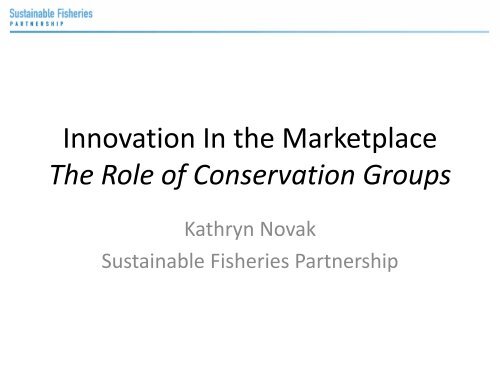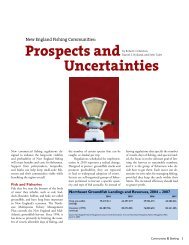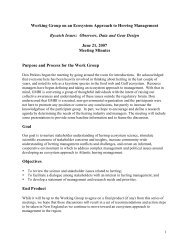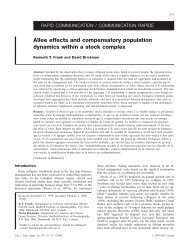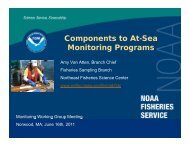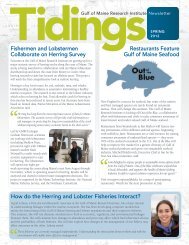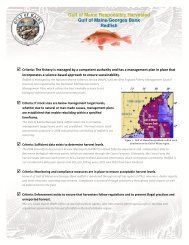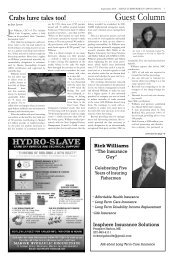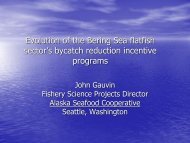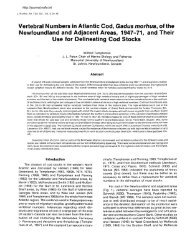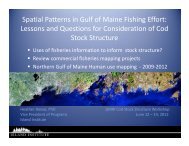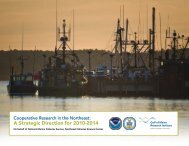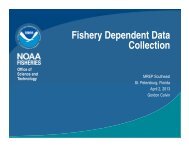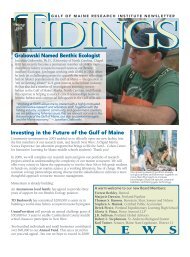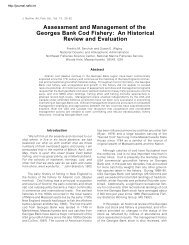Kathryn Novak - Gulf of Maine Research Institute
Kathryn Novak - Gulf of Maine Research Institute
Kathryn Novak - Gulf of Maine Research Institute
Create successful ePaper yourself
Turn your PDF publications into a flip-book with our unique Google optimized e-Paper software.
Innovation In the Marketplace<br />
The Role <strong>of</strong> Conservation Groups<br />
<strong>Kathryn</strong> <strong>Novak</strong><br />
Sustainable Fisheries Partnership
Our Role<br />
To maintain healthy ocean and aquatic ecosystems, enhance<br />
fishing and fish-farming livelihoods and secure food supplies.<br />
What We Do<br />
SFP works to leverage the purchasing power <strong>of</strong> the seafood supply chain to<br />
promote change in the water<br />
• Major Buyer Engagement (partnerships in core markets, seafood sector<br />
roundtables)<br />
• Fishery Improvement Projects (fishery level)<br />
• Aquaculture Improvement Projects (regional level)<br />
• Eco-Label strengthening and harmonization<br />
• Information Systems (FishSource, Sustainable Seafood Metrics System)
Sustainable Initiatives Timeline<br />
1970’s<br />
Sustainable<br />
Energy<br />
1980’s<br />
Sustainable<br />
Development<br />
1990’s 2000’s<br />
Sustainable<br />
Global<br />
Resources<br />
Warming<br />
www.sustainablefish.org
Evolution <strong>of</strong> the Sustainable Seafood Movement<br />
1980’s & 1990’s<br />
Global overfishing<br />
and habitat loss<br />
leads to decline <strong>of</strong><br />
many iconic fish<br />
stocks such as<br />
North Atlantic dod<br />
1997<br />
Uniliver<br />
(Birdseye) and<br />
World Wildlife<br />
Fund create<br />
Marine<br />
Stewardship<br />
Council<br />
2005<br />
IntraFish<br />
Media issues<br />
report stating<br />
the sustainable<br />
seafood<br />
movement has<br />
gone<br />
mainstream.<br />
2008<br />
Coalition <strong>of</strong><br />
nongovernmental<br />
organizations<br />
(NGOs)<br />
launches<br />
Common<br />
Vision<br />
1995<br />
Development<br />
<strong>of</strong> United<br />
Nations Food<br />
& Agricultureal<br />
Organization<br />
(FAO) Code <strong>of</strong><br />
Conduct for<br />
Responsible<br />
Fisheries<br />
1999<br />
Western Australia<br />
Rock Lobster<br />
receives first MSC<br />
certification as<br />
sustainable fishery.<br />
2007<br />
Global<br />
Aquaculture<br />
Alliance expands<br />
best aquaculture<br />
practices<br />
2009-2011<br />
Major buyers<br />
aligning with<br />
NGOs to<br />
develop<br />
sustainable<br />
seafood<br />
sourcing<br />
policies
New Seafood Value Proposition<br />
Sustainability<br />
Price<br />
Seafood<br />
Value<br />
Traceability<br />
Quality<br />
Safety
2012 - In The Press…<br />
www.sustainablefish.org
N. America Supply Chain Engagement<br />
Retailer<br />
NGO Partner<br />
Retailer<br />
NGO Partner<br />
Walmart<br />
WWF, SFP<br />
Metro<br />
Greenpeace Canada<br />
Costco<br />
WWF<br />
BJ’s Wholesale<br />
SFP<br />
Kroger<br />
WWF<br />
Giant Eagle<br />
SFP<br />
Supervalu<br />
WWF<br />
Whole Foods<br />
MBAq, MSC<br />
Safeway<br />
Fishwise<br />
Aldi<br />
SFP<br />
Loblaw<br />
WWF<br />
Wegman’s<br />
SFP<br />
Publix<br />
SFP<br />
Raley’s<br />
SFP<br />
Ahold<br />
New England Aquarium<br />
Delhaize<br />
<strong>Gulf</strong> <strong>of</strong> <strong>Maine</strong> <strong>Research</strong> Inst.<br />
Meijer<br />
SFP<br />
Sobey’s<br />
SFP
N. America Supply Chain Engagement<br />
Company<br />
McDonald’s<br />
Compass Group<br />
Aramark<br />
Sodexo<br />
Darden Restaurants<br />
Disney<br />
Sysco<br />
Santa Monica Seafood<br />
NGO Partner<br />
SFP<br />
Monterey Bay Aquarium<br />
Monterey Bay Aquarium<br />
MSC<br />
New England Aquarium<br />
SFP, Monterey Bay Aquarium<br />
WWF<br />
Monterey Bay Aquarium
6 Steps to Seafood Sustainability<br />
1. Make a commitment to have a corporate sustainable<br />
seafood policy.<br />
2. Collect data on seafood products.<br />
3. Buy environmentally responsible seafood.<br />
4. Make product information publicly available.<br />
5. Educate customers, suppliers, employees.<br />
6. Support reform to improve fisheries and aquaculture<br />
management.
What seafood buyers need to know<br />
• Is it legal?<br />
• Is it traceable?<br />
• Is it sustainable?
What seafood buyers need to know<br />
• Is it managed?<br />
• Does the management strategy follow<br />
scientific advice?<br />
• Do fishers comply with managers<br />
decisions?<br />
• Is the fish stock healthy?<br />
• Will the fish stock healthy in the<br />
future?<br />
• How is the fishery impacting the<br />
environment? (other species, habitat,<br />
etc.)
Aquaculture Issues<br />
• Environmental impacts<br />
• Water quality issues<br />
• Ocean pollution<br />
• Escapements<br />
• High density rearing<br />
contributing to disease<br />
outbreaks<br />
• Predator control<br />
• Wetlands conversion<br />
• Pond “sludge”<br />
• Excessive chemical use<br />
• Antibiotics<br />
• Anti-fouling net coatings<br />
• Pond treatment to kill pests
SFP supports a model <strong>of</strong> continuous improvement<br />
<strong>of</strong> global fisheries as a solid path forward in<br />
successfully rebuilding depleted fisheries<br />
worldwide.<br />
We encourage industry to support the same model<br />
<strong>of</strong> continuous improvement.<br />
www.sustainablefish.org
www.sustainablefish.org
Evolution <strong>of</strong> the Sustainable Seafood<br />
Movement<br />
Industry-led FIPs<br />
– Industry better positioned to lead FIPs<br />
• More leverage<br />
• More stake/interest<br />
– Benefit <strong>of</strong> industry-led…<br />
• More control over the process, debate, and outcomes<br />
– Lots <strong>of</strong> resources available to help<br />
• Like-minded NGOs, funding, FIP Toolkit<br />
16<br />
Document control number<br />
2012 © Sustainable Fisheries Partnership<br />
sustainablefish.org
Benefits <strong>of</strong> Leading a FIP<br />
• Better access to supply<br />
• Stronger relationships with suppliers<br />
• Competitive edge<br />
• Social Impact- Poverty Alleviation<br />
• Fisheries Stock stability and improvements<br />
• Customer satisfaction<br />
– Knowing product source<br />
– Environmental Impact<br />
– Humanitarian Impact<br />
17<br />
Document control number<br />
2012 © Sustainable Fisheries Partnership<br />
sustainablefish.org
Thank you!


